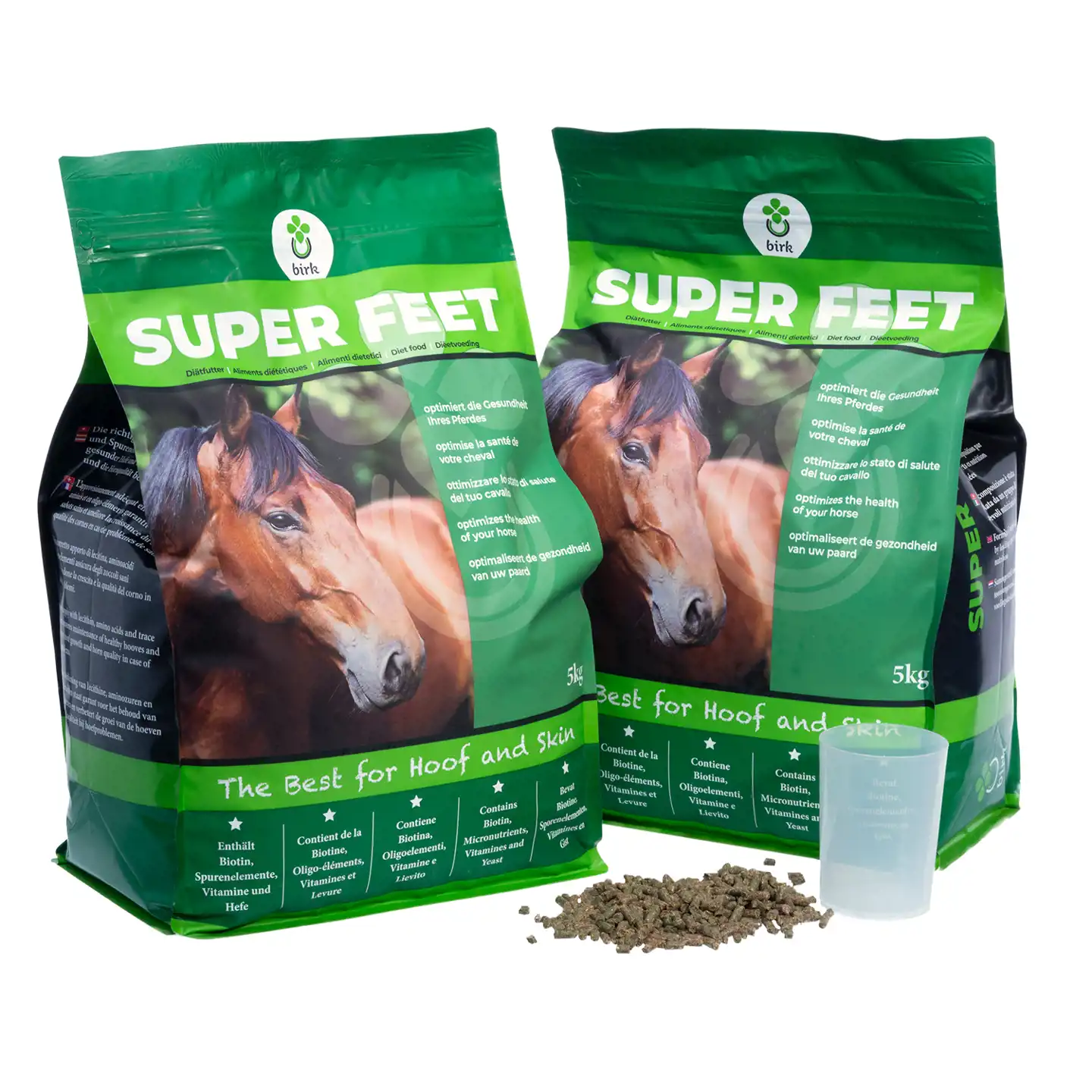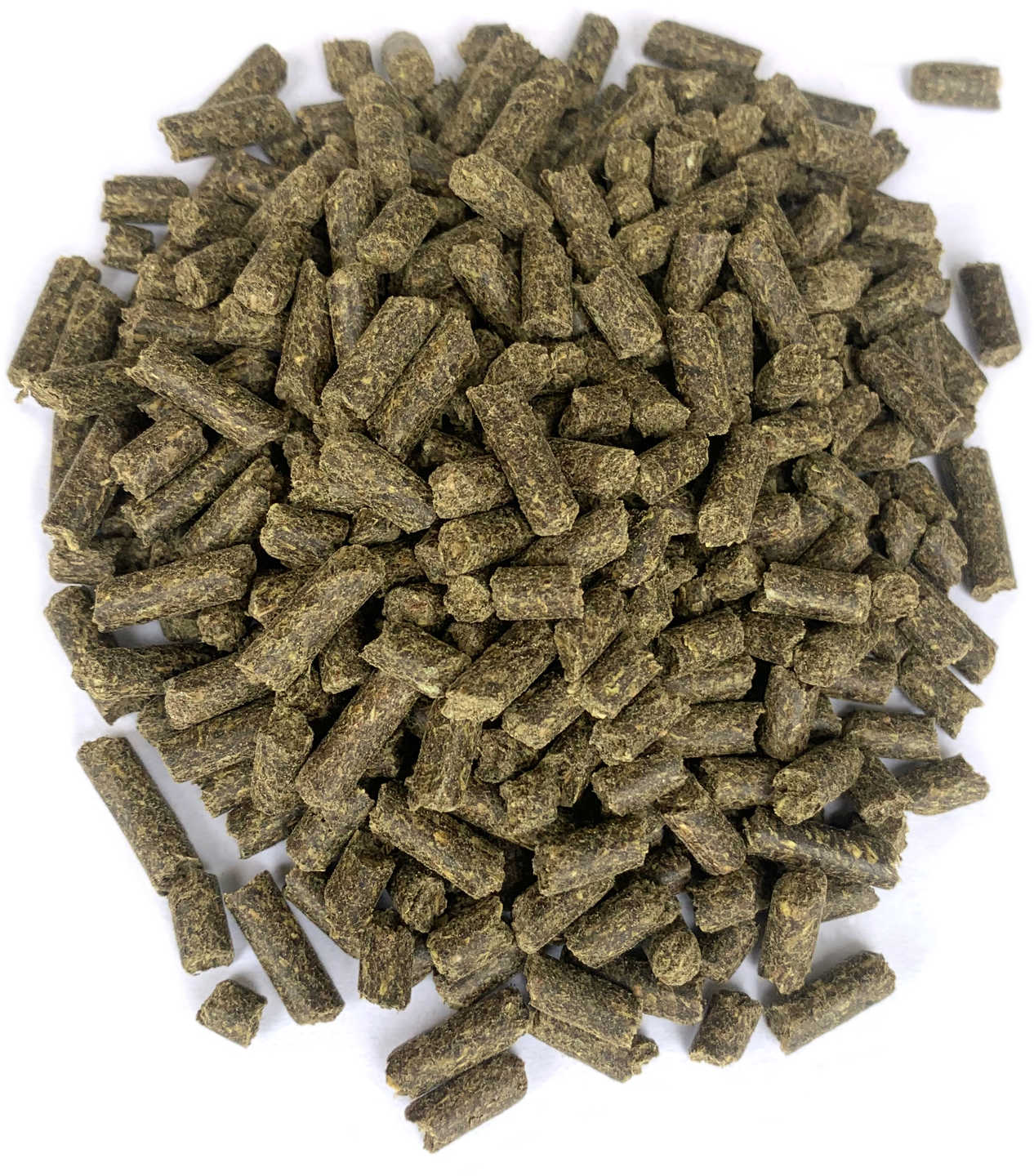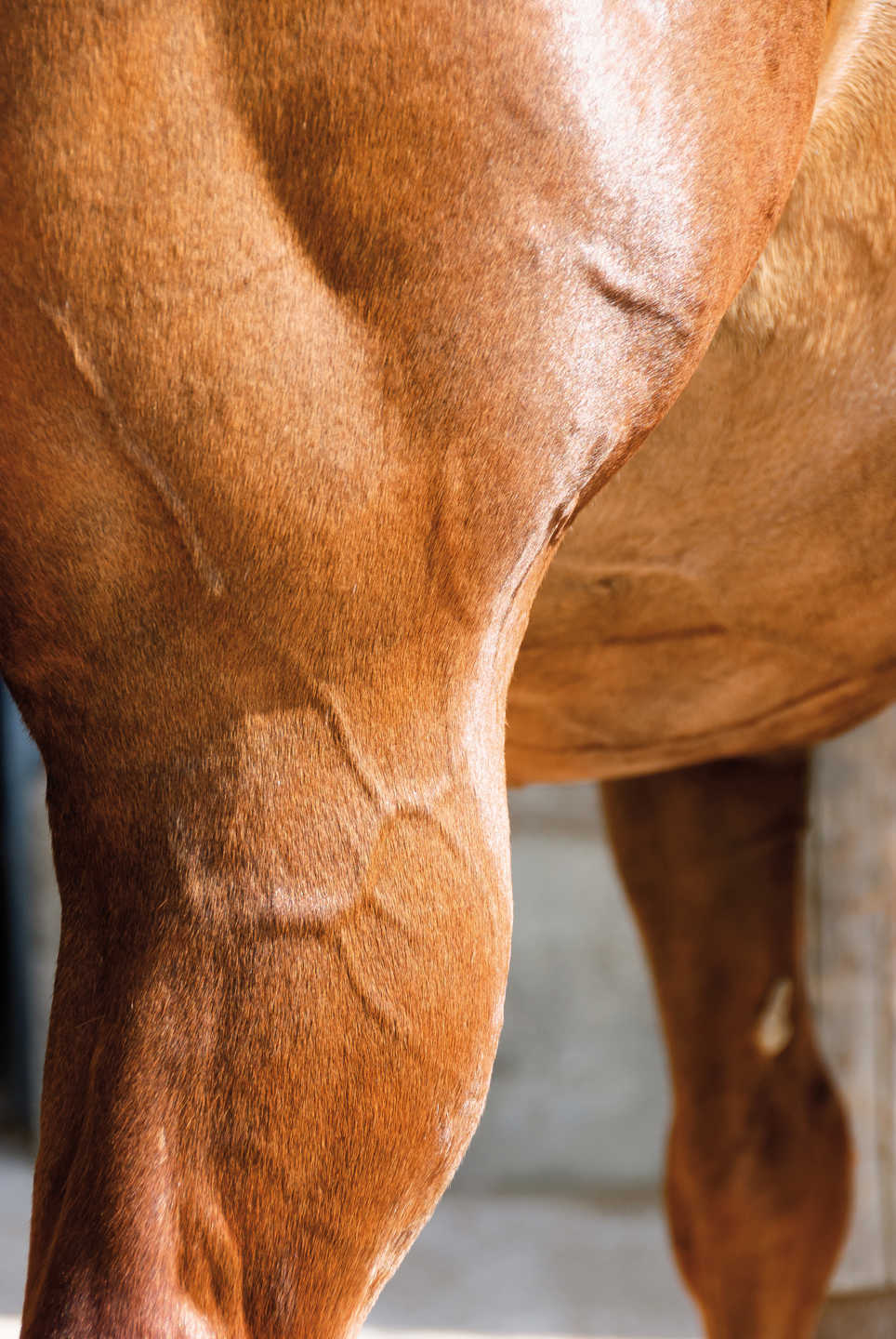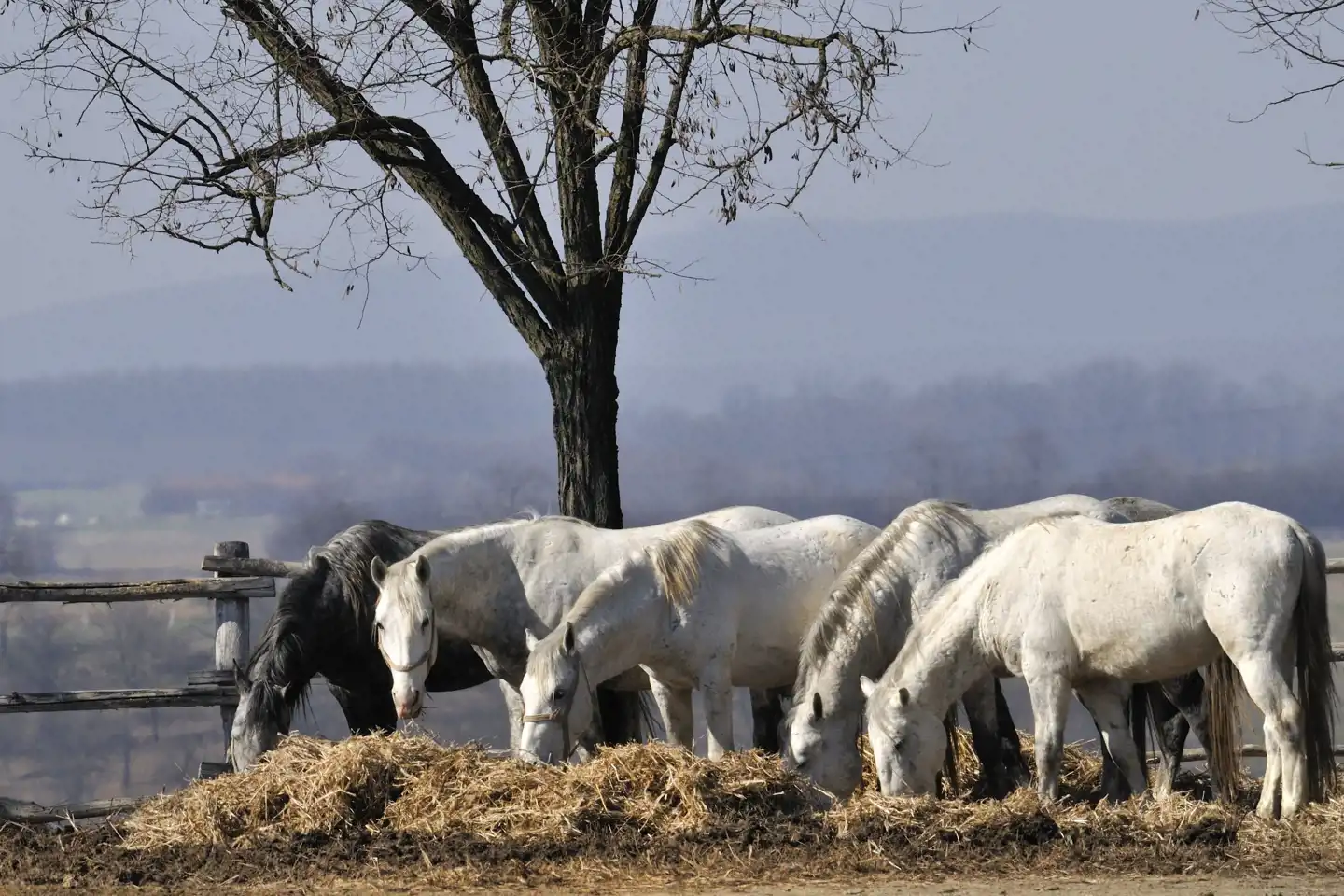Which horse feed supplement to choose?
Horse supplements are essential products for improving your animal's health and performance. They are designed to provide additional nutrients to help horses maintain good health and fill any nutritional gaps.
Our horse supplements are available in a variety of forms, including pellets, powders and oils. They can be administered by placing them directly into the animal's mouth or by mixing them into the feed.
Our range of BIRK products has been developed by experts in equine nutrition, offering a variety of benefits and uses for your horse.
For example, they have been formulated to help boost your horse's immune system, improve digestion and reduce the risk of disease. They can also contribute to the health of joints, bones, skin, hooves, muscles and tendons, which is particularly important for athletic horses.
In summary, horse supplements are an effective way to optimise your pet's health and performance. They can help to fill nutritional gaps in his diet and improve his overall health.
However, it is important to always follow the recommended dosage on the product packaging or consult your vet or hoof care specialist before introducing supplements into your horse's diet.
Case study: opt for a quality horse food supplement to improve health
A hoof specialist asks: A laminitis patient was given Birk Super Feet. A nutrition expert has said sugar is not good at all for laminitis patients.
The question was whether sugar could be causal for lameness in a horse with laminitis?
Birk Super Feet, the ideal complement to your horse’s feed, for optimal health!
Generally, administering sugar to a horse with laminitis is not recommended into its food. With Birk Super Feet, no sugar is added artificially into horse food. The sugar content of Birk Super Feet is very low at less than 3%. The starch content is also low at 5.3%. And with the relatively low amount of feed, this is not problematic, especially for horses with laminitis, insulin resistance or other metabolic problems.
Sugar is found in almost all natural base materials and therefore, by itself should not be considered a toxin. The sugar content in hay is about 5-8% and this is for about 10 kg of hay that an adult horse of 500 kg weight should receive daily.
Birk Super Feet, a low-sugar food supplement
The sugar content of Birk Super Feet is harmless even for a horse with laminitis. Birk Super Feet has a positive effect into horse feed both as a supplementary feed and as a dietary feed and is particularly suitable during recovery after illness or after an operation. Birk Super Feet is available from your veterinarian or hoof specialist.
Why is sulfur Important for horses?
The connective tissues of all mammals are rich in the mineral sulfur. The skin, hair, ligaments, tendons, cartilage and the hooves of horses are comprised of connective tissue. Collagen is the protein of connective tissue, and is the most abundant protein in the mammalian body. Sulfur, an important component of collagen, is required for both joint health and, in horses, healthy hooves. One dietary source of sulfur is methionine, an essential amino acid that the body can convert to another “sulfur containing” amino acid called cysteine. Once converted, cysteine furnishes the sulfur “welds,” or crosslinks, that are necessary for healthy collagen and thus strong connective tissue infrastructure. The lack of sulfur or methionine in a horse’s diet is known to lead to structural weakness in the ligaments, tendons, bones, joints, and hooves. However, too much sulfur in a horse’s diet can lead to over supplementation and weaken joint strength and hoof quality as well.
How does over supplementation occur?
Many hoof supplements contain sulfur in the form of the amino acid methionine. The added methionine balances the relative deficiency of methionine in the typical equine pasture and hay diet. Most equine joint supplements contain MSM, or methylsulfonylmethane, which contains around 34% sulfur. Sulfur over supplementation can result from feeding a hoof supplement with methionine along with a joint supplement containing MSM. The excess sulfur in the diet has been shown to block proper absorption of copper. Copper, along with vitamin C, is necessary for the formation of collagen and the building of healthy connective tissue for strong hooves and joints.
How can over supplementation be avoided?
There are other negative effects of over supplementation, and it is generally not a good idea to give more than one vitamin/mineral supplement to a horse. If the horse has joint problems in addition to hoof problems, joint supplements without additional sulfur can be given in addition to the hoof supplement. Avoiding other supplements with duplicate nutrients is key to reducing the risks of over supplementation. Giving a single balanced supplement backed by research and years of proven effectiveness is recommended, and can lead to a healthier and happier horse.
Birk Super Feet and Farrier’s Formula® Double Concentrate are formulated to provide nutrients to help build strong connective tissue, improve hoof and coat quality, and provides support for the joints.
The benefits of biotin for the horse
Horse biotin is necessary as a coenzyme for a multitude of metabolic functions, and is significantly important in the proper growth and strength of the connective tissue. Hooves, skin, hair, and tendons are structures comprised primarily of connective tissue. Supplementation of Horse biotin is safe - biotin is a water soluble vitamin, which means biotin is not stored in the body in any significant amounts.
What are the sources of biotin for the horse
Horse biotin is found naturally in pasture grasses and most feedstuffs fed to horses. Hindgut microbes normally manufacture sufficient biotin to meet the horse’s daily requirement.
Does it make a difference how the biotin is derived?
Natural source biotin from feedstuffs and pasture is the ideal Horse biotin source. Hoof supplements contain man-made biotin that is manufactured to be pure biotin. Synthetic biotin is absorbed and utilized by the horse. Hoof supplements typically provide supplementation of biotin at 10 to 30 mg per day.
What do you wish more people knew about horse biotin?
Although Horse biotin is an important nutrient for hoof health, hooves are more likely to benefit from a hoof supplement containing a balance of nutrients. Dr. Sue Kempson, a noted researcher at the University of Edinburgh in Scotland, studied structures in the hoof wall called tubules with an electron microscope. Dr. Kempson found that the horses that respond to biotin supplementation show microscopic defects of tubules in the outermost layer of hoof wall, while horses that have middle and inner wall tubule defects do not benefit from biotin supplementation. In a study of 33 samples of hoof wall trimmings, only two cases had tubule defects limited to the outer wall only. The other 31 (94%) had tubule defects in the middle and inner hoof wall. The horse in the case study with middle and inner wall tubule defects did not respond to six months of “biotin only” supplementation; however this horse did respond to Horse biotin plus calcium supplementation. (Kempson, S.A. 1987. Scanning electron microscope observations of hoof horn from horses with brittle feet. Vet. Rec. 120:568-570.)
The fundamental nutrients for hoof health
Horse biotin is only one of many nutrients needed for a healthy hoof into horse nutrition. An effective hoof supplement must contain a combination of amino acids, vitamins, minerals, fatty acids and phospholipids.
- Amino acids are the protein building blocks of tissue.
- Tyrosine is an amino acid component of thyroid hormone. Iodine, a mineral, is also a component of thyroid hormone. A deficiency can lead to low thyroid function, obesity, and poor hair coat and hoof quality. There is a strong relationship between tyrosine, iodine, hoof problems and obesity.
- Methionine is a sulfur containing amino acid deficient in grasses and grains. Methionine is important for the proper utilization of lipids and building the sulfur crosslinks that add strength to connective tissue.
- It is important to provide a hoof supplement with a balance of amino acids – an imbalance of the amino acid ratio leads to inefficient protein production and creates excess nitrogen metabolic byproducts.
- Vitamins are necessary for many metabolic processes and the general health of the horse and the hooves.
- Vitamin C supplementation is traditionally believed to be unnecessary in horses. However research conducted by Life Data Labs established that stabled or stressed horses often have minimal blood levels of ascorbic acid and therefore benefit from supplementation. Vitamin C is required for healthy and strong connective tissue.
- L-carnitine
- L-carnitine is a nutrient that provides the body with more energy. L-carnitine is an amino acid-like substance that is synthesized by the body from the amino acids lysine and methionine or ingested through food. L-carnitine plays an important role in transporting fatty acids to the mitochondria where they are used for energy. In addition, L-carnitine is also valued for its positive effect on metabolism and energy production. Among other things, it contributes to a normal energy-yielding metabolism to reduce tiredness and exhaustion and contributes to the normal functioning of the heart. It can also help improve the use of fat as an energy source.
- Mitochondria are cell organelles. They are found in animal and plant cells. As the "power plants of the cells" they produce the so-called adenosine triphosphate (ATP). It serves your body as an energy carrier and is required throughout the body.
- Copper is an important component of a multitude of metabolic functions. Copper deficiency leads to a number of abnormal conditions including defects in the pigmentation and strength of the hooves. Forages can be copper deficient, especially if grown in high rainfall areas.
- Zinc is required for the healthy maturing of keratin, a major component of the outer layers of dermal tissue. Proper keratin formation is important for wound healing, skin health, and hoof structure. Zinc can be present in less than ideal levels in forages.
- Calcium provides the adhesive “welds” between cells. Excess phosphorus in the diet can interfere with calcium absorption. Bran is high in phosphorus content.
- Fatty acids and phospholipids (phosphatidylcholine) add strength and pliability to connective tissues, and are also critical for healthy moisture balance.
The goal of a hoof supplement is to provide a balance of nutrients important for connective tissue formation that may be deficient in the horse’s diet, while at the same time preventing over-supplementation of any nutrients that may interfere with other nutrients.
Stress Relieve: Magnesium has been proven to relax horses
The mineral magnesium is said to have a relaxing effect on horses. This has now been scientifically proven for the first time in an Australian study.
Horses with magnesium deficiency are quickly and frequently frightened and tense.
The horse is a prey animal and as such is equipped with a pronounced flight instinct. But while the constant readiness to flee at lightning speed ensured the survival of the former wild horse, living with humans sometimes puts it to the test. When training and husbandry become a problem due to excessive nervousness, owners of skittish horses like to turn to magnesium, a mineral that is supposed to help nervous horses achieve greater composure.
Vital mineral
In fact, magnesium is of elementary importance for horses. The bulk element is important for the function of many enzymes, especially in nerve and muscle tissue, and plays a crucial role in the provision of energy and muscle tension. But magnesium can do even more: it helps build bone substance and tendons and - something many horse owners particularly appreciate - it calms the nerves. Because it inhibits the transmission of excitation, magnesium reduces stress.
A team from Charles Stuart University in South Wales investigated the effects of increased supplemental feeding of magnesium on the reaction speed of six Thoroughbred horses. Adding 10 g of magnesium to the daily roughage and concentrate ration, which already adequately met the daily requirement for the bulk element, resulted in a reduction of more than one-third in overall reaction time. Without the increased magnesium feeding, the reaction time was 5.3 meters per second; with supplementation, it slowed to 3.1 meters per second.
Magnesium deficiency has many faces
If the horse is deficient in magnesium, it shows this in various complaint patterns. Often, nervousness increases and horses tend to become tense. But general tiredness, reluctance to work, runny legs, circulatory problems, heavy breathing and even digestive problems can also be the result.
How much magnesium a horse needs depends on the weight and performance of the respective animal. The daily requirement is given in the literature with values between 4 g (pony with 200 kg live weight in maintenance) and 20 g (large horse with 800 kg live weight in heavy work).
These amounts are adequately covered in balanced feeding. A deficiency may nevertheless occur, for example, if the animals graze on intensively fertilized pastures with one-sided growth or if the hay comes from such pastures. In such cases, it may be necessary to add magnesium as a feed supplement.
However, the reason for an undersupply can also be an excess of calcium. Too much calcium displaces the magnesium and thus creates a deficiency. The right ratio of the two substances therefore plays a decisive role in daily feeding. Optimally, calcium and magnesium are in a ratio of 2 to 3:1.
Naturally, magnesium is contained in larger quantities, especially in linseed, wheat bran and brewer's yeast. An oversupply of the mineral is usually not a major problem for horses. Even administration of a dose up to four times the requirement did not lead to any disadvantages in tests. Only in combination with an excess of phosphorus does the risk of intestinal and urinary stone formation increase.
If there is any doubt as to whether a magnesium deficiency is present, the veterinarian can determine this by performing a CBC.
Unfortunately, even a blood test does not tell the whole story. The blood test is a snapshot of the minerals that are in the blood at that time. However, magnesium is also stored in other tissues. This means that magnesium may have just been released into the blood from other tissues at the time of the blood test. Therefore, take blood tests as a guide. Despite a good blood test, magnesium deficiency can still occur.




